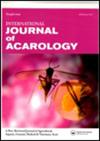文章题目河南省棘螨属三新种(蜱螨亚纲:棘螨科)
IF 1
3区 农林科学
Q3 ENTOMOLOGY
引用次数: 1
摘要
摘要本文对我国红皮蜂属的三个新种进行了描述和说明。它们分别是新寄生在锦葵科(Malvaceae)中的灰蝶(Aculops grewiae sp.nov.)和新寄生在圆锥花(Koeleuteria paniculata Laxm)中的锦葵(Aculpop koelreuteriae sp.nov..)。(Sapindaceae)和Tegolophus pogonatheri sp.nov.侵扰海百合(Poaceae)。它们都是下叶表面的流浪者,对寄主植物没有明显的症状。http://urn:lsid:zoobank.org:pub:B44F9CA4-7686-4998-A5D8-8170ac3656d本文章由计算机程序翻译,如有差异,请以英文原文为准。
Three new species of Anthocoptini (Acari: Eriophyidae) from Henan Province, China
ABSTRACT In this paper, three new species of the tribe Anthocoptini from China are described and illustrated. They are Aculops grewiae sp. nov. infesting Grewia biloba G.Don. (Malvaceae), Aculops koelreuteriae sp. nov. infesting Koelreuteria paniculata Laxm. (Sapindaceae) and Tegolophus pogonatheri sp. nov. infesting Pogonatherum crinitum (Thunb.) Kunth (Poaceae). All of them are vagrants on lower leaf surface and cause no apparent symptom to their host plants. http://urn:lsid:zoobank.org:pub:B44F9CA4-7686-4998-A5D8-8170CAC3656D
求助全文
通过发布文献求助,成功后即可免费获取论文全文。
去求助
来源期刊
CiteScore
2.20
自引率
9.10%
发文量
60
审稿时长
6-12 weeks
期刊介绍:
The International Journal of Acarology has a global readership and publishes original research and review papers on a wide variety of acarological subjects including:
• mite and tick behavior
• biochemistry
• biology
• control
• ecology
• evolution
• morphology
• physiology
• systematics
• taxonomy (single species descriptions are discouraged unless accompanied by additional new information on ecology, biology, systematics, etc.)
All submitted manuscripts are subject to initial appraisal by the Editor. If the English is not of a quality suitable for reviewers, the manuscript will be returned. If found suitable for further consideration, it will be submitted to peer review by independent, anonymous expert referees. All peer review is single blind.

 求助内容:
求助内容: 应助结果提醒方式:
应助结果提醒方式:


